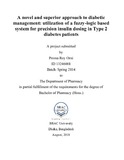| dc.contributor.advisor | Nirzhor, Saif Shahriar Rahman | |
| dc.contributor.author | Orni, Proma Roy | |
| dc.date.accessioned | 2018-12-04T04:53:39Z | |
| dc.date.available | 2018-12-04T04:53:39Z | |
| dc.date.copyright | 2018 | |
| dc.date.issued | 2018-08 | |
| dc.identifier.other | ID 13246001 | |
| dc.identifier.uri | http://hdl.handle.net/10361/10953 | |
| dc.description | This project report is submitted in partial fulfilment of the requirements for the degree of Bachelor of Pharmacy, 2018. | en_US |
| dc.description | Catalogued from PDF version of project report. | |
| dc.description | Includes bibliographical references (page 48-52). | |
| dc.description.abstract | Diabetes, a complex heterogeneous disease, characterized mainly by hyperglycemia due to defects in the pancreatic β-cells. The treatment necessities and individualization of care of a diabetes depend on the patient’s pathophysiology of Diabetes Mellitus, which underpins their clinical presentation and classification of diabetes. The management of normal blood glucose level in diabetes patient often possess many challenges due to the complexity of the disease, uncertainties and vagueness of the symptoms involved. Treatment of Diabetes Mellitus includes proper education, evaluation of macro-vascular and micro-vascular complications, minimization of cardiovascular complications and most importantly normalization of blood glucose level to prevent long-term risk factors. Most often patient with diabetes mellitus fails to maintain their glycemic target after initial therapy with oral therapeutic agents. The therapeutic option for such patients include switching to insulin therapy. The conventional way of adjusting insulin dose often includes incorporating uncertainties in the physician’s decision, which leads to vagueness in the prediction of insulin dose. This study aims on the management of normal blood glucose concentration for type 2 diabetes patient who are on insulin therapy, through the intervention of a fuzzy-logic based system that will provide a precise insulin dosage, preventing future health complications. The fuzzy logic controller system has sculpted an important place in the field of medical science, whose fuzzy-rule based output provides very precise and an accurate approach. In this study, two patient-related factors, which are average daily fat intake (grams) and duration of diabetes (years), for 18 patients are taken under consideration to utilize the data for the development of fuzzy rule base in MATLAB. The fuzzy logic system was then used to develop an output, which was later compared with the physician’s prescribed dose for each patient. This system was found to generate output (customized insulin dose for individual patient) that was found to be more credible and reasonable when compared with the patient’s past medical history. Moreover, the predicted insulin dose by the fuzzy-logic system used in this study recommends insulin dose for patients which suggests to eliminate incidence of hyperglycemic and hypoglycemic events in patients with type 2 diabetes. Thus, the use of fuzzy-logic system provides future hope for the customization of insulin dose for individual patient which will further improve the quality of life of type 2 diabetes patient. | en_US |
| dc.description.statementofresponsibility | Proma Roy Orni | |
| dc.format.extent | 52 pages | |
| dc.language.iso | en | en_US |
| dc.publisher | BRAC University | en_US |
| dc.rights | BRAC University project reports are protected by copyright. They may be viewed from this source for any purpose, but reproduction or distribution in any format is prohibited without written permission. | |
| dc.subject | Diabetic | en_US |
| dc.subject | Insulin | en_US |
| dc.subject.lcsh | Diabetic retinopathy. | |
| dc.subject.lcsh | Diabetic retinopathy--Treatment. | |
| dc.title | A novel and superior approach to diabetic management: utilization of a fuzzy-logic based system for precision insulin dosing in type 2 diabetes patients | en_US |
| dc.type | Project report | en_US |
| dc.contributor.department | Department of Pharmacy, BRAC University | |
| dc.description.degree | B. Pharmacy | |

